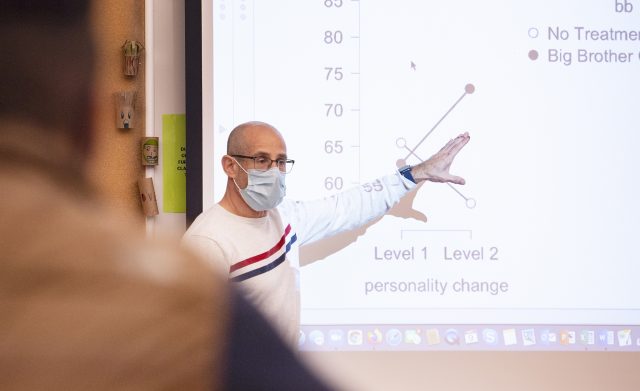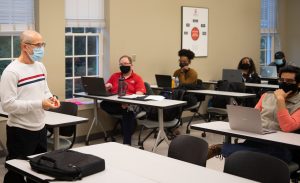
Richard Balkin, interim chair and professor of leadership and counselor education and coordinator of the counselor education doctoral program, teaches EDRS 705: Advanced Quantitative Research Methods. The course is included in the graduate minor in applied statistics. Photo by Logan Kirkland/Ole Miss Digital Imaging Services
OXFORD, Miss. – An academic minor with an emphasis on applied statistics at the University of Mississippi is experiencing phenomenal growth.
Since its inception, the Graduate School’s interdisciplinary minor in applied statistics program has admitted 123 students, and 39 have been awarded the certificate or graduated with the minor. Sixty-four students are enrolled this fall.
Students graduating from the program learn to analyze data from a broad range of disciplines, which can fuel innovation and collaborations with other professions. The program can prepare graduates for careers in research or in fields where problem-solving is critical.
“We started as the graduate interdisciplinary certificate in applied statistics program in fall 2015 and transitioned into the interdisciplinary graduate minor in applied statistics in fall 2017,” said Yunhee Chang, professor of nutrition and hospitality management and director of the program.
“Most students in this program are pursuing a Ph.D. The minor helps them learn up-to-date advanced statistics and apply rigorous analysis to their research.”
Besides the number of students who have completed the program, it has facilitated an increase in the number and type of course offerings on campus in the area of applied statistics, and helped to bring speakers to campus – in-person and virtually – to talk about important and state-of-the-art topics in applied statistics.
Associated with the College of Liberal Arts and the schools of Accountancy, Applied Sciences, Business Administration, Education and Pharmacy, the interdisciplinary academic program – often referred to as GMAS – consists of a minimum of 15 credit hours. It was created to facilitate students who want to gain additional expertise in statistical analysis that enables them to pursue more advanced research questions/problems in their own discipline and consult with others on statistical analyses.
“The graduate minor in applied statistics was created by faculty who saw a need and responded,” said Annette S. Kluck, dean of the Graduate School. “Although faculty broadly engage in research, possessing more advanced statistical expertise is less common and is an asset when looking for jobs and applying for extramural funds such as grants.
“Essentially, they are gaining additional skills that will enable them to be leading scholars in the future.”
It is important to note that the program has been truly interdisciplinary from its inception, said John Bentley, who served as its first director.
“What makes the GMAS so exciting is the willingness of our students and faculty to learn from other disciplines regarding how advanced statistical methods are being applied elsewhere,” said Bentley, director of the Center for Pharmaceutical Marketing and Management and professor of pharmacy administration and marketing.

Richard Balkin (left), interim chair and professor of leadership and counselor education and coordinator of the counselor education doctoral program, talks to students in his EDRS 705: Advanced Quantitative Research Methods class. Photo by Logan Kirkland/Ole Miss Digital Imaging Services
“Although there is much in common across academic disciplines regarding the use of statistical methods, there are enough differences that interacting with others outside your own discipline regarding statistical methods may lead people to say, ‘I never thought of it that way,’ which may contribute to the discovery of new knowledge.”
Current and former students praised the minor as “life-changing.”
“I enrolled in the program to better my understanding of contemporary data analysis,” said Solomon Kurz, an Enumclaw, Washington, native who received his doctorate in clinical psychology from Ole Miss in 2018. “My current job is as a research psychologist within the VA health care system, where I analyze data on a daily basis. The program helped ground me in the skills necessary for my job.”
Scott Dankel, who received his doctorate in kinesiology from the university in 2019, said he enjoyed the classes and figured they would be important for future research.
“It has been extremely beneficial,” the Howell, New Jersey, native said. “I am always able to compute all of the statistical analyses for my research studies without requiring any assistance. I am also often asked to help compute statistics for other faculty members and master’s students within our department.”
Completing the GMAS helped Olena Ciftci, of Kyiv, Ukraine, receive a graduate assistantship in the School of Applied Sciences’ analytics lab.
“The interdisciplinary graduate minor in applied statistics is an additional substantial educational experience that I proudly point out in the cover letters when applying for assistant professor positions in universities,” said Ciftci, a doctoral candidate in the Department of Nutrition and Hospitality Management who also serves as a graduate student council senator.
“I think having the minor on my CV shows my interest and ability to conduct and participate in different types of research and teach statistics and research-related courses.”
One of the best benefits for Brandon McLeod has been the ability to enroll in statistics courses in different disciplines.
“Apart from those in the higher education department, I had classes in psychology, political science and pharmacy administration,” said McLeod, a doctoral candidate from Mobile, Alabama, and assistant director of global engagement.
“Each course and professor provided a unique perspective, which helped me better understand the framing of research questions, research design and statistical analysis. I was also able to familiarize myself with several statistical programs and languages.”
Required courses include an introductory statistics course, an intermediate statistics course and three additional intermediate/advanced courses beyond any applied statistics courses required in a student’s home degree program, all of which must be approved by the program coordinator. Students must earn at least a B in every course counted toward the minor.
For more information about the graduate minor in applied statistics, contact Yunhee Chang at chang@olemiss.edu or at 662-915-1352.